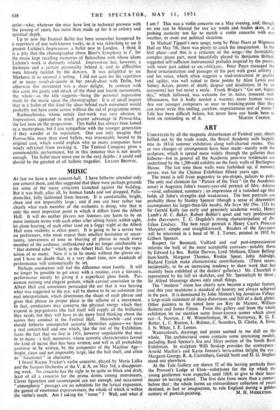MUSIC
AT last we have a new concert-hall. I have hitherto attended only one concert there, and this suggested that there were perhaps grounds for some of the many criticisms launched against the building. But it was built, after all, by human hands and not dropped, Palla- dium-like, fully fashioned from heaven. It is comfortable, bright, clean and not impossibly large ; and if one can hear rather too clearly what each member of the orchestra is doing, why that is only the most important point in which it differs from the Albert Hall. It will do neither players nor listeners any harm to be on more intimate terms with each other after sitting barely within sight, let alone hearing, of each other (and on a foggy night at the Albert Hall even visibility is often poor). It is going to be a severe test on performers, who must expect their smallest hesitation or uncer- tainty, unevenness of tone or blurring of phrase to reach every member of the audience, unblanketed and no longer attributable to "that damned echo" which, in the Albert Hall, has saved the repu- tation of so many. Now it is to be music without the gloves on ; and I have no doubt that, in a very short time, new standards of performance will -automatically be set.
Perhaps conductors will feel the difference most keenly. It will no longer be possible to get away with a routine, even a slovenly, performance merely by giving it a superficial gloss finish. Pas- sionate miming and elegant gesture, which carried conviction in the Albert Hull and sometimes persuaded the ear that it was hearing what was suggested to the eye, will be shown to be no substitute for real interpretation, which determines the shape of each phrase and gives that phrase its proper place in the scheme of a movement. In fact, conductors may conserve the physical energy which they expend in pep-gestures (the hall itself will supply all the brilliante they need), but they will have to do more hard thinking about the scores they conduct in the Festival Hall. Meanwhile—and even should hitherto unsuspected acoustic blemishes appear—we have a real concert-hall and one which, like the rest of the Exhibition, faces the fact that we live in 1951, however unpalatable that may be to many ; a hall, moreover, whose acoustic characteristics favour the kind of music that has been written, and will in all probability continue to be written, by the composers of the Machine Age— bright, clean and not impossibly large, like the hall itself, and often as " functional" in character.
I found Racine Fricker's violin concerto, played by Maria Lidka and the Jacques Orchestra at the V. & A. on May 3rd, a disappoint- ing work. No concerto has the right to be quite so bleak and drab, least of all a concerto for the prima donna among instruments. Clever figuration and counterpoint are not enough, and occasional " atmospheric " passages are no substitute for the lyrical expansion, the gamut of emotional expressiveness, the whole of which is within the violin's reach. Am I asking for " tunes" ? Well, and what if I am ? This was a violin concerto on a May evening, and, though no one can be blamed for our icy winds and leaden skies, it is pushing austerity too far to match a violin concerto with our weather, or even our political situation.
In Michael Tippett's new songs, sung by Peter Pears at Wigmore Hall on May 7th, there was plenty to catch the imagination. In the first place—and this is a criticism of the songs—the formidably complex piano part, most beautifully played by Benjamin Britten, suggested self-sufficient instrumental preludes inspired by the poems, with voice part added as an, obbligato- Peter Pears managed the florid ornamentation and passages of his part with great artistry ; and his voice, which often suggests a reed-instrument in quality and agility, was well suited to these poems by Alun Lewis and Sidney Keyes, poems of death, despair and desolation, lit by an occasional leer but never a smile. Frank Bridge's "Go not, happy day," which followed, was welcome for its naive, innocent mel- lifluousness, but it badly needed a warmer, more human voice. Are our younger composers so near to breaking-point that they can never write this smiling, carefree, unpretentious sort of music ? Life has been difficult before, but never have our bards been se


































 Previous page
Previous page